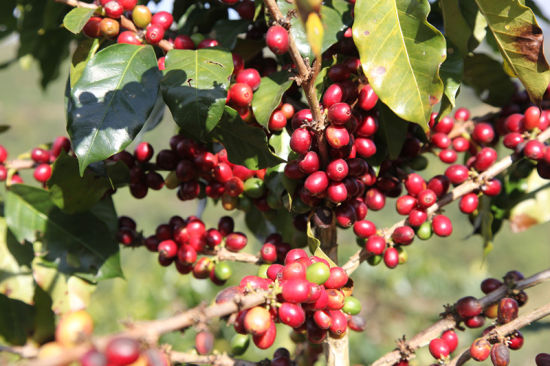The history of coffee, one of the three biggest drinks in the world, how do people know coffee Arabica good coffee
Coffee is a beverage made from roasted coffee beans, which is the main drink popular in the world along with cocoa and tea.
Coffee tree is a small evergreen tree of Rubiaceae. Coffee for daily consumption is made from coffee beans combined with various cooking utensils, and coffee beans refer to the nuts in the fruit of coffee trees, which are then baked in an appropriate way. The taste of a standard cup of coffee should not be bitter, and a qualified barista will strictly carry out every step when making coffee. Finally, the coffee presented to the guests will show varying degrees of sweetness, acidity, mellow thickness or cleanliness in the taste.
History editor
The word "coffee" comes from the Greek word "Kaweh", which means "strength and passion". Coffee tree is a small evergreen tree of Rubiaceae. Coffee for daily consumption is made from coffee beans combined with various cooking utensils, and coffee beans refer to the nuts in the fruit of coffee trees, which are then roasted by appropriate roasting methods. All over the world, people like drinking coffee more and more. The "coffee culture" that follows is full of every moment of life. No matter at home, in the office, or on various social occasions, people are tasting coffee, which is gradually associated with fashion and modern life.
Coffee trees are native to the highlands of southwestern Ethiopia in Africa. It is said that more than a thousand years ago, a shepherd found that the sheep had eaten a kind of plant, became very excited and lively, and then discovered coffee. It is also said that a coffee forest was accidentally destroyed by a wildfire, and the smell of barbecue coffee attracted the attention of surrounding residents.
Local aborigines often grind the fruit of the coffee tree and knead it with animal fat to make many ball-shaped balls. These indigenous tribes use these coffee balls as precious food for soldiers who are about to go out to battle. It was not until around the 11th century that people began to use boiled coffee as a drink. In the 13th century, Ethiopian troops invaded Yemen and brought coffee to the Arab world. Because the Islamic doctrine forbids people to drink alcohol, some religious people think that this kind of drink stimulates the nerves and violates the doctrine. Coffee shops were banned and closed for a time, but the Egyptian sultan thought that coffee was not against the doctrine, so the ban was lifted. Coffee drinks quickly became popular in the Arab region. The word coffee Coffee, which comes from the Arabic Qahwa, which means "plant drink", later spread to Turkey and became the source of the word in European languages. The method of growing and making coffee has also been continuously improved and perfected by the Arabs.
The cultivation and production of coffee in the 17th century has always been monopolized by Arabs. At that time, it was mainly used in medicine and religion, and doctors and monks admitted that coffee had the effects of refreshing, awakening, strengthening the stomach, strengthening the body and stopping bleeding. The use of coffee was documented at the beginning of the 15th century and was integrated into religious ceremonies during this period. At the same time, it also appeared in the folk as a daily drink. Because drinking was strictly forbidden in Islam, coffee became a very important social drink at that time.
In 1570, when the Turkish army besieged Vienna and failed to retreat, a bag of black seeds was found in the Turkish army's barracks. No one knew what it was. A Polish man who had lived in Turkey took the bag of coffee and opened his first coffee shop in Vienna. At the end of the 16th century, coffee began to spread into Europe on a large scale through Italy in the name of "Islamic wine". It is said that at that time, some Catholics thought coffee was a "devil's drink" and encouraged Pope Clemon VIII to ban it, but after the pope tasted it, he thought it was drinkable and blessed it, so coffee became more and more popular in Europe.
At first, coffee was expensive in Europe. Only aristocrats could drink coffee, and coffee was even called "black gold". Until 1690, a Dutch captain sailed to Yemen and got some coffee seedlings, which were successfully planted in Indonesia. In 1727, the wife of a diplomat in Dutch Guiana gave some coffee seeds to a Spaniard in Brazil, where he planted them with good results. The climate in Brazil is very suitable for coffee growth, and coffee has spread rapidly in South America since then. Coffee, which has fallen in price due to mass production, began to become an important drink for Europeans.

Important Notice :
前街咖啡 FrontStreet Coffee has moved to new addredd:
FrontStreet Coffee Address: 315,Donghua East Road,GuangZhou
Tel:020 38364473
- Prev

What is a capsule coffee machine? What are the advantages and disadvantages of the capsule coffee machine? A kind of Italian coffee machine
Capsule coffee machine is a kind of Italian coffee machine, which makes the operation of extracting coffee more simple and convenient. When operating the machine, first open the handle on the top of the machine, then put the coffee capsule into the capsule on the top, then close the handle and extract the coffee with one click, which is very easy to operate compared with the semi-automatic coffee machine with coffee powder. Advantages: automatic coffee needs to be ground and pressed.
- Next

How to grow Arabica coffee beans, one of the most important coffee trees in the world?
Arabica species (scientific name CoffeeArabica). The origin of Arabica species is Ethiopia's Abyssinia Plateau (present-day Ethiopian Plateau). In the early days, it was mainly used as medicine, and in the 13th century it developed the habit of baking and drinking. It was introduced into Europe through the Arab world in the 16th century and further became a favorite drink all over the world.
Related
- Guji coffee producing area of Guji, Ethiopia: Humbela, Shakiso, Wulaga
- What is the most expensive variety of Qiloso in BOP multi-variety group?
- How to store the coffee beans bought home?
- Why are Yemeni coffee beans so rare now?
- Ethiopian Sidamo all Red Fruit Sun Sun Santa Vini Coffee beans
- SOE is mostly sour? What does it mean? Is it a single bean? what's the difference between it and Italian blending?
- Is Italian coffee beans suitable for making hand-brewed coffee?
- How to choose coffee beans when making cold coffee? What kind of coffee beans are suitable for making cold coffee?
- Just entered the pit to make coffee, what kind of coffee beans should be chosen?
- Can only Japan buy real Blue Mountain Coffee? What are authentic Jamaican Blue Mountain coffee beans?

